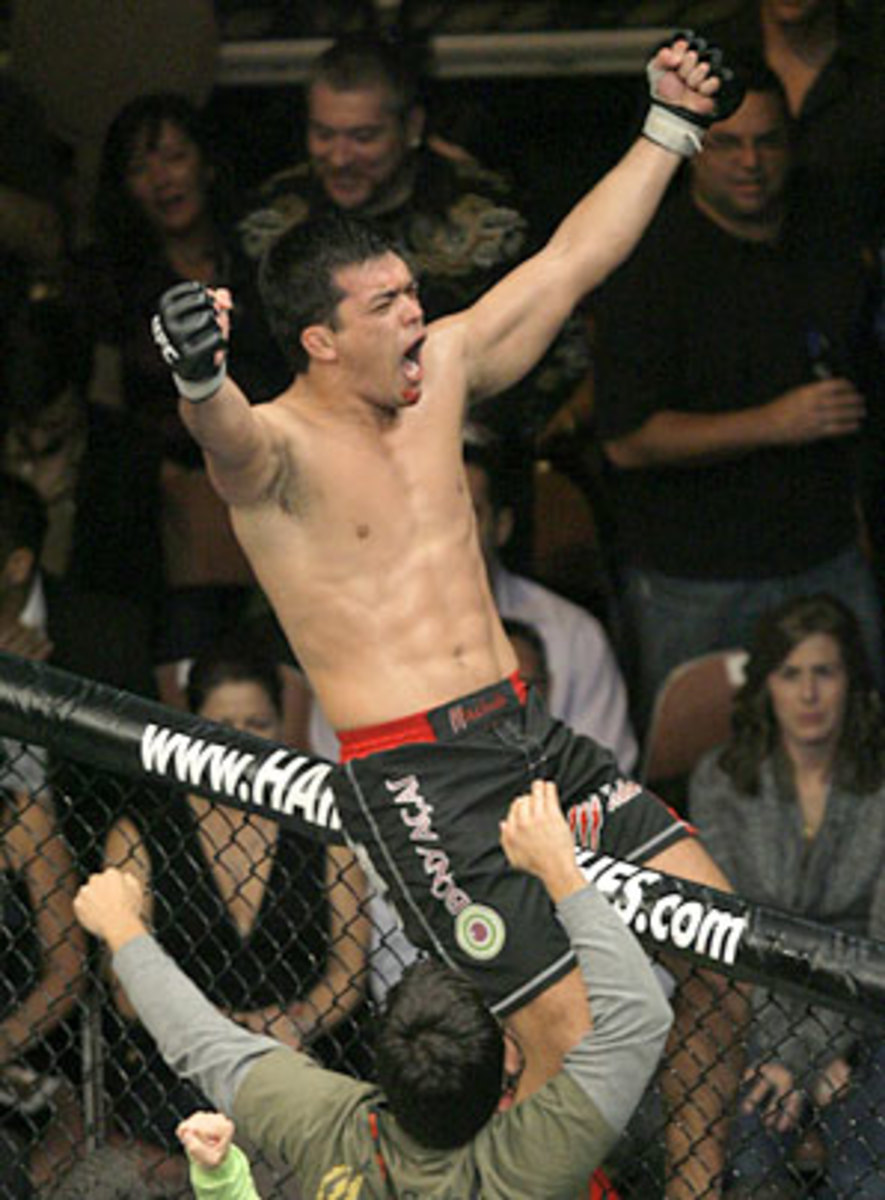Machida being made to look like bad guy for turning UFC down
Here's a hypothetical question to prompt an uncomfortable amount of soul-searching: say your boss comes to you with an offer for a promotion that initially sounds good, but upon closer inspection it seems like it might not be the best deal for you. Not enough money for the responsibility. Say the more you think about it, the worse the deal sounds. The question is: how much of a raise would it take to make a bad idea seem like a good one?
Former UFC light heavyweight champion Lyoto Machida confronted a question along those lines this week when UFC president Dana White came to him with an offer to step in as a late-notice injury replacement against Rashad Evans at UFC 133. The fight was a little over three weeks away when Machida got the call, and since no one trains especially hard the week of the fight, that meant only two weeks of real preparation time.
Machida told Sherdog.com that he initially thought it sounded doable, but then White wanted him to immediately leave Brazil for the U.S. to do his training camp on American soil, and the more he considered the prospect, the more it sounded like a situation where he had more to lose than gain.
After all, Machida already owns a win over Evans, so how much would he benefit from another one? And while Machida's been hanging out on the beach awaiting a fight offer, Evans has been in the gym for a full training camp, preparing diligently for his big comeback fight. Once you start tallying it all up, there seem to be more marks in Evans' column than in Machida's.
But rather than go all Nancy Reagan on it and Just Say No, Machida seems to have tried for a compromise. Sure, he'd fight Evans, he told the UFC, but they'd have to make it worth his while. They'd have to pay him like they pay his countryman, middleweight champion Anderson Silva.
If you're having this conversation with White, here's where the stream of expletives is likely to begin. Not only did White opt not to pay Machida "Anderson Silva money" to take the fight, but also immediately turned around and used the request against him.
White gathered reporters on a media conference call on Thursday to announce that, yes, Tito Ortiz had agreed to take the fight (without asking for a pay raise, White noted), but also that Machida had asked for more than the UFC felt he was worth. Other fighters like Chris Leben and Chael Sonnen were willing to step up and fight out of their weight classes to do the UFC a solid, White pointed out, but Machida was trying to hold the company up for more cash.
It's the PR equivalent of pointing at someone in public and saying in a loud voice, "Can you believe this freaking guy?" If it's not an outright attempt to burn Machida in the press, it's at least an attempt to scorch him a little.
As much as White doesn't care for fighters and their management talking about contract details or salary figures to the media, he has no problem doing it when it suits his needs. Putting Machida on blast for holding his hand out not only serves the purpose of retribution against a fighter who had the temerity to say no, but also sends a message to every other man on the roster that private negotiations need only stay private for as long as the UFC is happy with them.
The end result is that Machida comes away looking like the bad guy -- or worse, a fighter out of touch with the reality of his own worth -- while Ortiz is suddenly the hero in the white hat.
The funny part is that when you think about it, Machida's actions seem totally reasonable. Stepping in on a couple weeks' notice to fight a guy he already beat is not a good deal for him. If he wins, so what? If he loses, his stock falls big time. It's not so absurd for him to be asked to be compensated for assuming that risk.
Sure, you can argue over the dollar amount. Maybe instead of Anderson Silva money, he should have asked for "Rampage" Jackson money or, even better, Tito Ortiz money. But that's not the point.
The point is if the UFC is asking Machida to act against his own best interests by taking a short-notice fight with very little for him to gain, shouldn't it offer him something special to account for the special circumstances?
And no, telling him that if he wins, he'll be "in the mix" for a title shot doesn't count. Just ask Evans, who was the number one contender this time last year and is still not guaranteed the next title shot, even with a win at UFC 133. The UFC has failed to keep that promise too often for it to be sufficiently motivating, which leaves guaranteed money as the next most reasonable carrot to dangle in the face of an ambivalent fighter.
The UFC loves to talk about how it "takes care of" the fighters who take care of it, and that's fine. Giving out free money is always going to make you popular in the short-term. But if that's how you reward fighters who pitch in and help out when the UFC needs it, what's so wrong about them asking their employer to put it in writing beforehand?
Theoretically, at least, what Machida did makes perfect sense. He asked for special compensation under special circumstances. Not only did he not get it, he got a UFC smackdown in the press -- and, as a result, in the court of public opinion -- just for asking. That's a lesson dearly purchased for Machida, and a warning shot likely heard loud and clear throughout the ranks.






